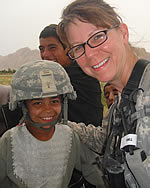BIN LADEN DEAD: ‘Justice was done’
The war on terror will not end because Osama bin Laden has been killed, but his death can be a critical turning point, said observers and experts at East Carolina University.
“I think it shows the world that we are not going to stop until we’ve done our very best to promote justice,” said Pat Frede, senior chief petty officer in the U.S. Navy Reserve and director of development and alumni affairs for the College of Allied Health Sciences.

Senior Chief Petty Officer Pat Frede poses with an Afghan child during her most recent deployment to the country. Contributed photo
Frede was recalled to active duty in support of Operation Enduring Freedom in 2009 and spent nearly a year in Afghanistan. On Monday, after news that bin Laden died in an American attack on his compound in Pakistan, she emailed colleagues and friends in hopes of learning more about how the Afghan people feel.
“Are they relieved? Has a burden been lifted?” Frede asked. “Maybe the people will have hope that there is a choice that you can better your life if you want to.”
Frede said she hopes bin Laden’s death will lead to improvements in the education and health care systems in Afghanistan, a country where only 15 percent of the people can read and write.
At a small, quickly organized student rally on campus, Aaron Hall, 20, of Asheboro, welcomed what he called a victory for the military.
“It’s a war we are going to keep on fighting for a while because of the complex constituencies and interests,” he said. “This is a critical step in the right direction.”
Hall has a friend, James (Travis) Roberts from Virginia, who serves in the U.S. Navy. That means Hall follows international events carefully. The military gets ample criticism for what it does, and, in the instance of bin Laden, for what it doesn’t do, Hall said. That makes this development critical, he said.
“It’s nice to know that they have been working on it all this time, and that now this step has been taken,” he said.
“I saw it on Facebook and thought that it would be cool to come out and celebrate what our military did,” Hall said.
Elsewhere, Dr. M. Saeed Dar, a professor of pharmacology at the Brody School of Medicine at ECU is a native of Pakistan and an active member of the local Islamic Center. He called bin Laden’s death a significant event. He, al-Qaida and terrorists represent a “small, extreme fringe” of Muslims, Dar said.
“This should have been done 10 years ago,” he said of bin Laden’s death. “Bad deeds result in a bad end, and I think justice was done.”
Dar was in Pakistan last month and noted the civilian deaths al-Qaida and related groups caused there and in other Muslim countries. He doubts the death of al-Qaida’s leader will immediately reduce violence and could inspire terrorists.
“A crystal ball I don’t have, but knowing the mentality of these extreme elements, I am pessimistic,” Dar said. “They have nothing to lose.”
The killing of bin Laden will send a message to terrorists about American resolve and strong leadership, said Dr. Jalil Roshandel, director of the security studies program at ECU and associate professor of political science. In the short run it may cause some acts of desperate terrorism, but it will also expose terrorists and reveal their hideouts, he said.
A war on terror cannot succeed without reliable intelligence, Roshandel said. Therefore, the operation that led to the death of bin Laden shows positive signs and improvement of U.S. intelligence.